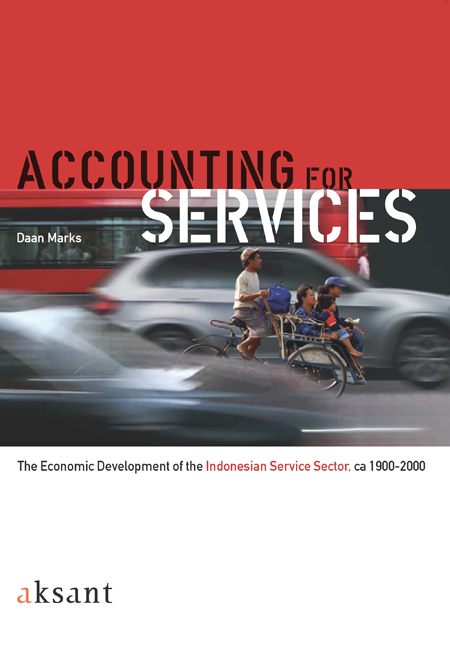Book contents
- Frontmatter
- Contents
- List of Tabels
- Acknowledgement
- 1 Introduction
- 2 National Accounting for Services in Indonesia
- 3 The Development of the Indonesian Service Sector: A Quantitative Analysis
- 4 Roads to Riches? Transportation and Economic Development in Indonesia
- 5 Involution and Growth: the Ambiguous Role of the Trade Sector in the Economic Development of Indonesia
- 6 Unity or Diversity?: Market Integration through Trade and Transport
- 7 Conclusions
- Appendices
- References
5 - Involution and Growth: the Ambiguous Role of the Trade Sector in the Economic Development of Indonesia
Published online by Cambridge University Press: 19 January 2021
- Frontmatter
- Contents
- List of Tabels
- Acknowledgement
- 1 Introduction
- 2 National Accounting for Services in Indonesia
- 3 The Development of the Indonesian Service Sector: A Quantitative Analysis
- 4 Roads to Riches? Transportation and Economic Development in Indonesia
- 5 Involution and Growth: the Ambiguous Role of the Trade Sector in the Economic Development of Indonesia
- 6 Unity or Diversity?: Market Integration through Trade and Transport
- 7 Conclusions
- Appendices
- References
Summary
INTRODUCTION
A widely held belief in economics is that openness to trade accelerates economic development. Classic economic treatises by luminaries such as Adam Smith and David Ricardo showed early on the potential gains of trading between nations. For elaborations of these theories, Paul Samuelson and Bertil Ohlin were rewarded the Nobel Prize in Economic Sciences in 1970 and 1977 respectively. Nevertheless, strong critics of globalisation continue to exist. Those opponents argue that trade accentuates and deepens poverty, both in rich and in poor countries. Advocates of globalisation, however, claim that trade promotes growth, and in turn growth reduces poverty (Bhagwati and Srinivasan 2002).
Much of the evidence in support of and against globalisation has been based on cross-country growth regressions. Srinivasan and Bhagwati argue that ‘In fact, while such regressions can be suggestive of new hypotheses and be valuable aids in thinking about the issue at hand, we would reiterate that great caution is needed in using them at all as plausible “scientific” support’ (Srinivasan and Bhagwati 1999: 38). Therefore they call for nuanced and in-depth studies to get a better understanding of the relationship between trade and economic development.
The case of Indonesia is especially interesting. As Booth argues:
‘Indonesia's involvement in the world economy did transform the local economies of the producing regions through the provision of infrastructure and the growing demand for inputs and services. And yet, the transformation of Indonesia into an open export-oriented economy in the nineteenth and twentieth centuries did not lead to rapid structural change, and sustained economic development.’ (Booth 1998: 203)
This observation points to the ambiguous role that the trade sector has played in the process of economic development in Indonesia. On the one hand, Indonesia's export orientation has enhanced economic growth in some periods, but failed to do so in other periods. At the same time, domestic dynamics transformed the sector from one in which the happy few reaped the benefits to one of last resort. Numerous workers who were pushed out of the agricultural sector and whom manufacturing industries failed to absorb found employment in petty trade, which is characterised by low entry barriers and great flexibility.
- Type
- Chapter
- Information
- Accounting for ServicesThe Economic Development of the Indonesian Service Sector, ca 1900–2000, pp. 131 - 158Publisher: Amsterdam University PressPrint publication year: 2009



